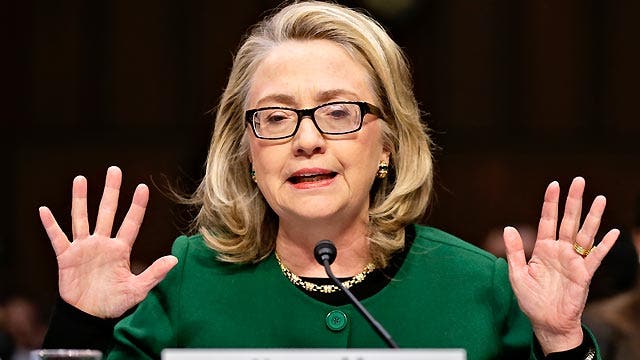Republicans are challenging a host of statements made by Secretary of State Hillary Clinton and Democratic allies during Wednesday's heated Libya testimony -- claiming that complaints about a lack of funding are bogus and questioning the secretary's insistence she never saw urgent cables warning about the danger of an attack.
The questions come as the Senate Foreign Relations Committee begins its confirmation hearing for Sen. John Kerry, D-Mass., who was tapped to replace Clinton at the department.
One issue that may come up is the department's funding. Assertions that State Department posts are left vulnerable because Congress has decided not to fully fund security requests pervaded Wednesday's hearings.
"Shame on the House for ... failing to adequately fund the administration's request," Rep. Gregory Meeks, D-N.Y., said
Democratic New York Rep. Eliot Engel repeatedly said Congress had "slashed" diplomatic security requests.
Clinton, in turn, affirmed their claims, saying budget issues are a "bipartisan problem."
Budget numbers, though, actually show the overall diplomatic security budget has ballooned over the past decade.
Democrats point to modest decreases in funding in recent years, and the fact that Congress has approved less than was requested. But Congress often scales back the administration's requests, and not just for the State Department.
And the complaints tend to overlook the fact that the overall security budget has more than doubled since fiscal 2004.
For that year, the budget was $640 million. It steadily climbed to $1.6 billion in fiscal 2010. It dipped to $1.5 billion the following year and roughly $1.35 billion in fiscal 2012 -- still far more than it was a decade ago.
Slightly more has been requested for fiscal 2013.
It's difficult to tell how much was specifically allocated for Benghazi. Tripoli was the only post mentioned in the department's fiscal 2013 request -- funding for that location did slip, from $11.5 million in fiscal 2011 to $10.1 million the following year.
Slightly more has been requested for fiscal 2013.
Still, then-Deputy Assistant Secretary for Diplomatic Security Charlene Lamb testified in October that the size of the attack -- and not the money -- was the issue.
Asked if there was any budget consideration that led her not to increase the security force, she said: "No."
She added: "This was an unprecedented attack in size." Asked again about budget issues, Lamb said: "Sir, if it's a volatile situation, we will move assets to cover that."
Asked Wednesday about Lamb's testimony, Clinton noted that the review board that examined the Libya attack found budget issues have played a role.
"That's why you have an independent group like an (Accountability Review Board); that's why it was created to look at everything," Clinton said.
But Rep. Dana Rohrabacher, R-Calif., said "any suggestion that this is a budget issue is off base, or political."
Other lawmakers further complained that the State Department has spent millions on lower-priority projects that could have been spent on security.
Another pivotal issue Wednesday dealt with an Aug. 16 cable. That cable summarized an emergency meeting the day before by the U.S. Mission in Benghazi and warned the consulate could not defend against a "coordinated attack."
That cable is seen as one of the vital warnings sent out of Libya in the months leading up to the attack. But, to the dismay of lawmakers, Clinton repeatedly said she never saw it.
"That cable did not come to my attention. I have made it very clear that the security cables did not come to my attention or above the assistant secretary level," Clinton said. "I'm not aware of anyone within my office, within the secretary's office, having seen the cable."
Rep. Michael McCaul, R-Texas, said "somebody within your office should have seen this cable."
"An emergency meeting was held and a cable sent out on Aug. 16 by the ambassador himself, warning of what could happen. And this meant this cable went unnoticed by your office. That's the bottom line," he said.
Clinton said it was "very disappointing" that "inadequacies" were found in the "responsiveness of our team here in Washington," and said "it's something we're fixing and intend to put into place protocols and systems to make sure it doesn't happen again."
The secretary tried to explain that "1.43 million cables" come through the department every year. They are addressed to her but in many cases do not go to her. Rather, they go through "the bureaucracy."
Republicans argue the Aug. 16 cable was rather high priority. As Sen. Rand Paul, R-Ky., put it, "Libya has to have been one of the hottest of hot spots around the world." He claimed that not knowing about their security requests "really, I think, cost these people their lives."
"Had I been president at the time, and I found that you did not read the cables from Benghazi, you did not read the cables from Ambassador Stevens, I would have relieved you of your post. I think it's inexcusable," Paul said.





